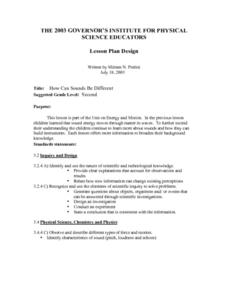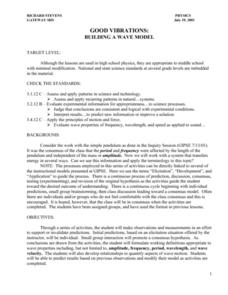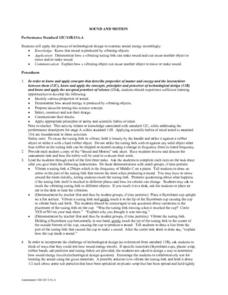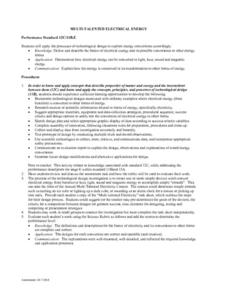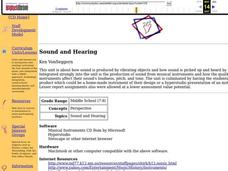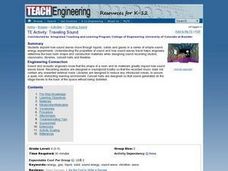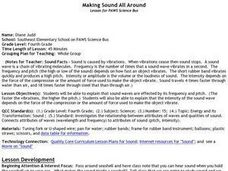Curated OER
Noise and Your Ears: Worth Hearing About
In this science worksheet, students complete various puzzles demonstrating knowledge of the ear and how it processes sound. An illustration of the ear with descriptions of each part is provided.
Curated OER
What Does Motion Have to do with Sound?
Second graders investigate and explore sound energy. They investigate how the vibrational motion moves through matter in waves. Students describe sounds and vibrations. They observe that vibrational motion creates sounds. Students record...
Curated OER
How Can Sounds Be Different
Second graders explore energy and motion. They investigate how sound energy moves in waves. Students explore how sounds are varied and how the instruments that make those sounds are built. They observe sounds being produced and predict...
Curated OER
Sound
First graders investigate sound and recognize the importance of hearing. They listen to and identify sounds in the environment, classroom, and on a pre-recorded tape. The students classify each type of sound and participate in a Sound...
Curated OER
Good Vibrations: Building a Wave Model
Students assess and apply recurring patterns in natural systems. They evaluate the wave properties of frequency, wavelength, and speed as applied to sound. Students develop a relationship to quantify aspects of wave motion. They predict...
Curated OER
Sound And Motion
Students investigate the concept of sound and vibration. They use a tuning fork to make an observation. Students then propose the ideas of different experimental designs to test the concept. The ideas are constructed and then tested.
Curated OER
Multi-Talented Electrical Energy
Students explore energy conversions by demonstrating the conversion of electrical energy into light, heat, sound, and magnetic energy. Students create a simple device that converts electrical energy from batteries to heat, light, sound...
Curated OER
Vibrating Objects Produce Sound
Students use many different materials and resources in order to study and identify sounds that are loud or soft, high or low, pleasant or unpleasant.
Curated OER
Heat and Light Come From Various Sources
First graders study heat and light and how they come from various sources. They list sources of heat and light and identify the different energy sources as heat, light, or both heat and light.
Curated OER
Placebo - 1
Young scholars explore the placebo effect, thus producing the positive effects of acupuncture without needle insertion. Students discuss echolocation. They participate in hands-on/minds-on activities in reflected sound waves. They...
Curated OER
Vibration and Pitch
Fifth graders investigate the relation between vibrations and pitch. They observe and discuss an experiment involving a bicycle and a piece of cardboard in the spokes, listen to a comb with cardboard, and listen to various sounds and...
Curated OER
Echolocation Lab
Students explore echolocation of animals. They examine how dolphins and other echolocating animals use their senses to locate and identify objects without using their sense of sight. Through experimentation, they discover how sound waves...
Curated OER
Sound and Hearing
Learners discover how sound is produced by objects and picked up and heard by humans. Using musical instruments, they identify how the quality can affect the loudness, pitch and tone of the sound. They develop their own instrument or a...
Curated OER
Sound--Music or Noise?
Students are introduced to the concept of sound and how it is presented in the world around them. Using scientific terms, they describe the properties of sound and create their own definitions of sound, music, and noise. They demonstrate...
Curated OER
Sound and Hearing
Students form an understanding that there are many different types of sound. The core concepts are presented in the most basic form for elementary school. Also students investigate how sound travels.
Curated OER
TE Activity: Pitch and Frequency
Students experiment with a vibrating ruler and a kazoo to study the different pitches and frequencies they produce. They create both high and low pitch sound waves. They examine how engineers use sound energy when designing electronic...
Curated OER
Traveling Sound
Young scholars explore how sound waves move through liquids, solids and gases in a series of simple sound energy experiments. They describe how sound needs molecules to move and that changing the medium that it travels through changes...
Curated OER
Tuned in: Tuning Forks and Sine waves
Students explore the characteristics of a pure sound wave produced by a tuning fork. They use sine waves to find a curve to fit the sound wave data produced by the tuning fork. A CBL and microphone is required for this activity.
Curated OER
Sound All Around Us
Students make predictions about how sound is formed. They view and discuss a video that explores sound formation and attempt to identify the origin of different sounds.
Curated OER
Sound Waves
Sixth graders discover how sound is made from vibration and moves in all directions from the source in waves. They see that sound waves can be "seen" if they are translated into light. An excellent experiment is imbedded in this lesson.
Curated OER
Speed of Sound
Learners examine the phenomenon of sounds traveling slower than light. They discover why they see things before they hear them and how to estimate the speed of sound as homework.
Curated OER
Traveling at the Speed of Sound
Students discuss sound and how it's measured, and through experimentation and implementation of the scientific method, they determine the speed of sound.
Curated OER
Musical Mysteries
Pupils explore the components of sound and how it can be represented visually. A trip to a circus and a walk through a magical forest are used to encourage visualizations and creative thinking.
Curated OER
Making Sound All Around
Fourth graders examine how sound waves are effected by frequency and pitch. They conduct experiments using tuning forks, rubber bands, balloons, and water, and answer questions about the experiments.




